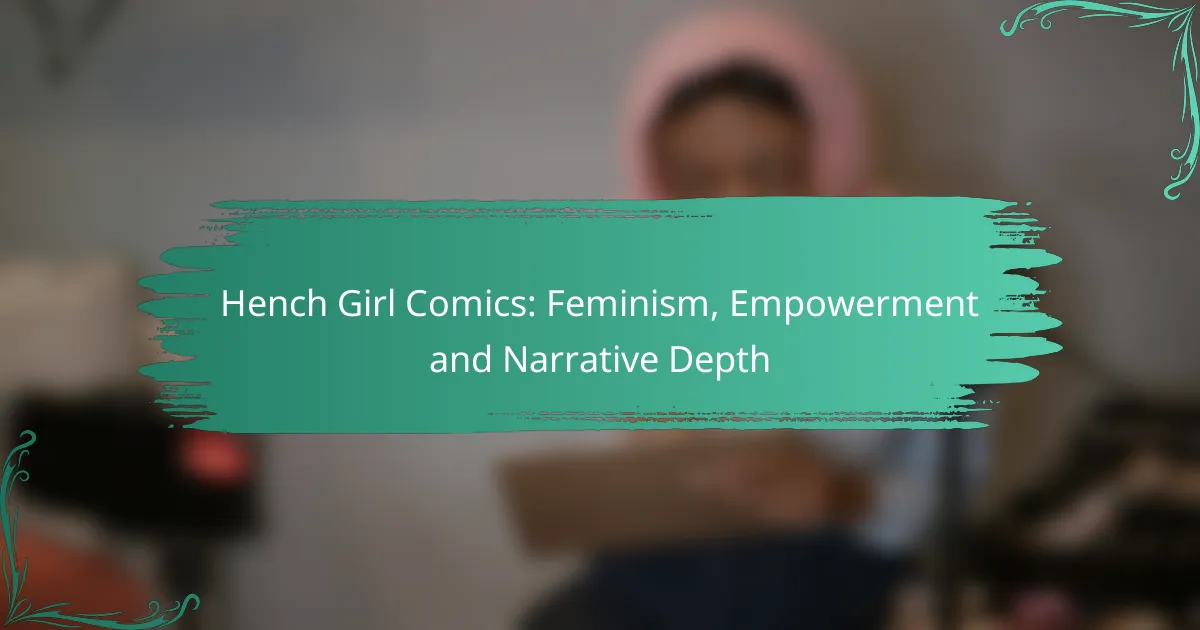Hench Girl Comics serve as a powerful platform for feminism, featuring female characters who challenge stereotypes and engage in rich, complex narratives. By focusing on themes of empowerment, identity, and social justice, these comics highlight the journeys of women as they navigate their personal and societal challenges. This innovative approach diverges from traditional superhero tropes, emphasizing character depth and meaningful storytelling that resonates with modern audiences.
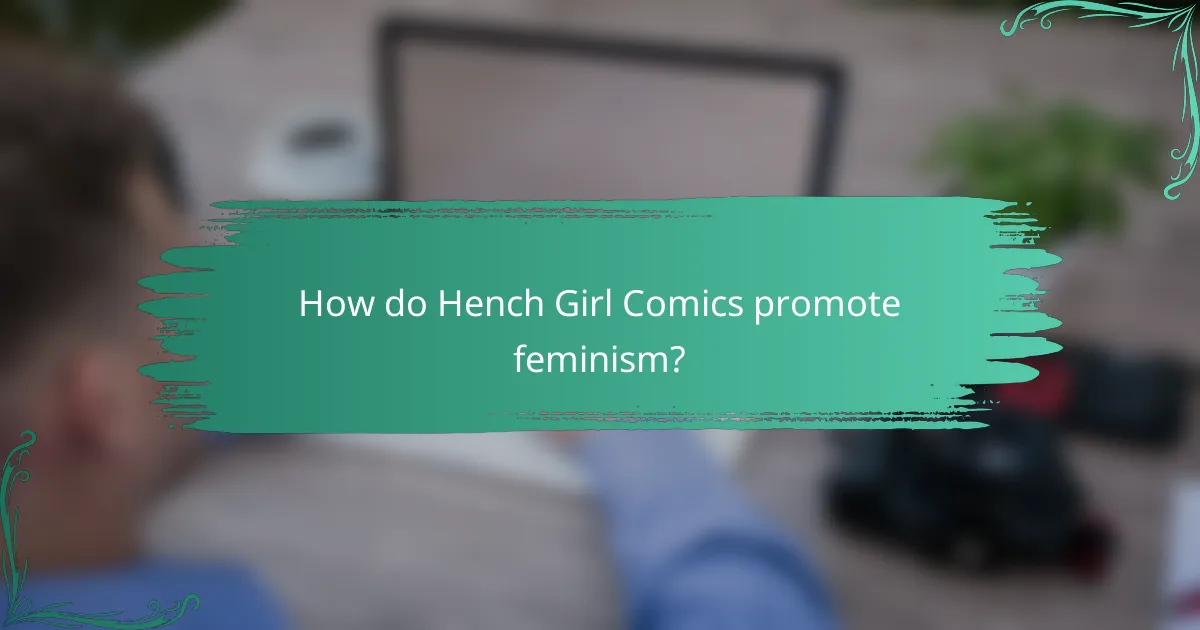
How do Hench Girl Comics promote feminism?
Hench Girl Comics promote feminism by showcasing narratives that empower women and challenge societal norms. These comics feature female characters who defy stereotypes, engage in complex storylines, and embody strength and resilience.
Representation of strong female characters
Strong female characters in Hench Girl Comics are often depicted as multifaceted individuals with their own goals, flaws, and strengths. Rather than being mere sidekicks or love interests, these characters take center stage, driving the plot forward and influencing the outcomes of their stories.
For example, characters may possess unique skills or backgrounds that contribute to their roles as leaders or innovators. This representation allows readers to see women in positions of power, fostering a sense of identification and inspiration among female audiences.
Challenging traditional gender roles
Hench Girl Comics actively challenge traditional gender roles by placing women in non-traditional roles, such as villains, anti-heroes, or complex protagonists. This subversion of expectations encourages readers to rethink preconceived notions about femininity and strength.
By portraying women as capable of both good and evil, these comics illustrate that gender does not dictate moral alignment or capability. This nuanced approach helps dismantle stereotypes and promotes a broader understanding of gender identity.
Highlighting women’s empowerment
Women’s empowerment is a central theme in Hench Girl Comics, often illustrated through characters who take control of their destinies. These narratives emphasize self-agency, resilience, and the importance of community support among women.
Through their journeys, characters often confront and overcome obstacles, showcasing the power of determination and collaboration. This focus on empowerment serves as a motivational tool for readers, encouraging them to pursue their own aspirations and challenge societal limitations.
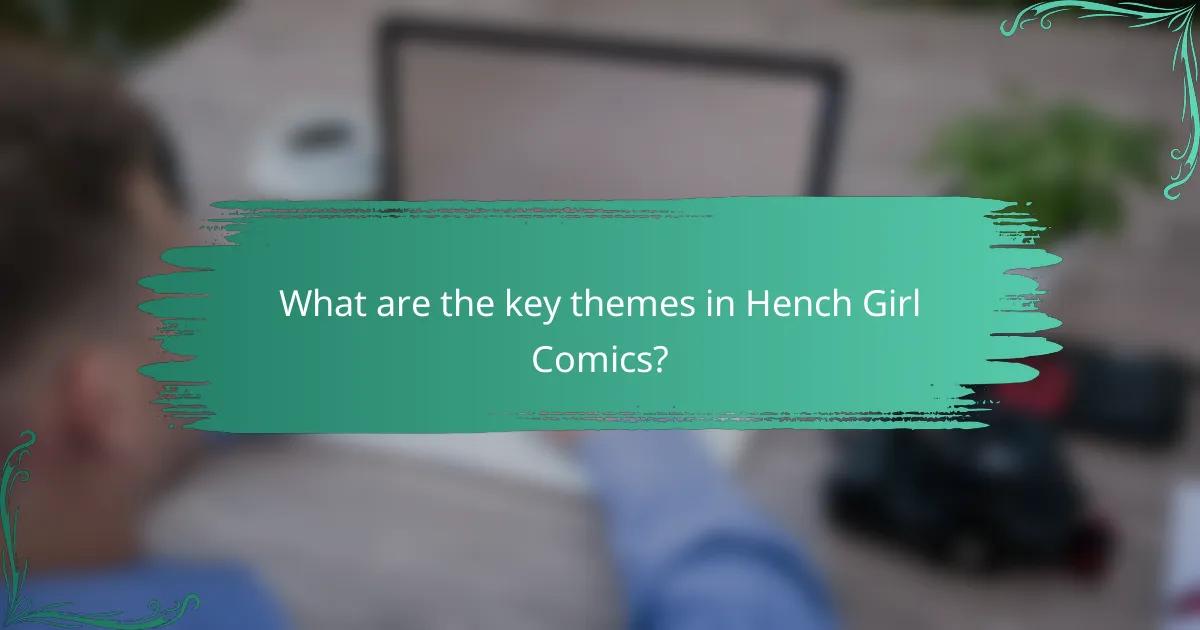
What are the key themes in Hench Girl Comics?
Hench Girl Comics explore themes of feminism, empowerment, and narrative depth through engaging storytelling and character development. Central to these comics are the journeys of female characters as they navigate identity, friendship, and social justice.
Identity and self-discovery
Identity and self-discovery are pivotal themes in Hench Girl Comics, as characters often grapple with their roles in a world dominated by superheroes and villains. These narratives encourage readers to reflect on their own identities and the societal expectations placed upon them.
For example, a character might start as a sidekick but gradually realize her own strengths and aspirations, leading to a powerful transformation. This journey of self-discovery resonates with many readers, particularly young women seeking to understand their place in society.
Friendship and collaboration
Friendship and collaboration are essential elements in Hench Girl Comics, showcasing how female characters support one another in their quests for empowerment. These relationships often highlight the importance of teamwork and mutual respect in overcoming challenges.
Through shared experiences, characters learn to rely on each other, demonstrating that collaboration can lead to personal growth and collective success. This theme encourages readers to value their friendships and recognize the strength found in unity.
Social justice and activism
Social justice and activism are prominent themes in Hench Girl Comics, reflecting contemporary issues and the characters’ responses to them. These comics often address topics such as inequality, discrimination, and the fight for rights, empowering readers to engage with social issues.
Characters may take part in protests or advocate for change, illustrating the impact of activism. By portraying these struggles, Hench Girl Comics inspire readers to consider their roles in promoting justice and equality in their own communities.
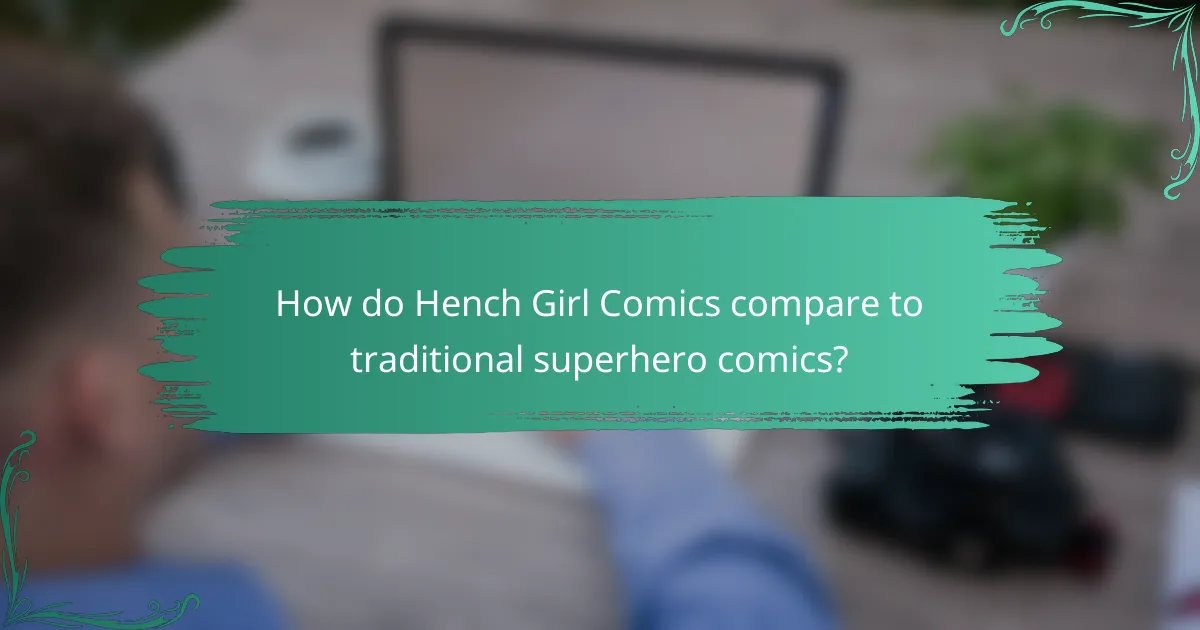
How do Hench Girl Comics compare to traditional superhero comics?
Hench Girl Comics often diverge from traditional superhero comics by focusing on the experiences and growth of female characters, rather than solely on action and heroics. This shift emphasizes empowerment, character depth, and a nuanced narrative that resonates with contemporary audiences.
Focus on character development
In Hench Girl Comics, character development is prioritized, allowing readers to connect with protagonists on a personal level. These stories often explore the complexities of identity, relationships, and personal growth, showcasing characters who evolve beyond their roles as mere sidekicks or villains.
For instance, a hench girl may grapple with her loyalty to a villain while discovering her own moral compass. This internal conflict adds layers to her character, making her journey relatable and engaging.
Subversion of classic tropes
Hench Girl Comics frequently subvert traditional superhero tropes, challenging stereotypes associated with female characters. Instead of being relegated to the role of damsel or sidekick, female characters are portrayed as multifaceted individuals with their own ambitions and struggles.
For example, a hench girl might outsmart her male counterparts or choose to abandon a life of crime for a more fulfilling path, thereby redefining what it means to be a “hero” or “villain.” This subversion encourages readers to rethink established narratives in superhero lore.
Inclusive storytelling approaches
Inclusive storytelling is a hallmark of Hench Girl Comics, often featuring diverse characters and perspectives. This inclusivity not only reflects a broader range of experiences but also invites a wider audience to engage with the narratives.
By incorporating various backgrounds, identities, and experiences, these comics foster a sense of belonging among readers. This approach can lead to richer stories that resonate with individuals from different walks of life, enhancing the overall impact of the narrative.
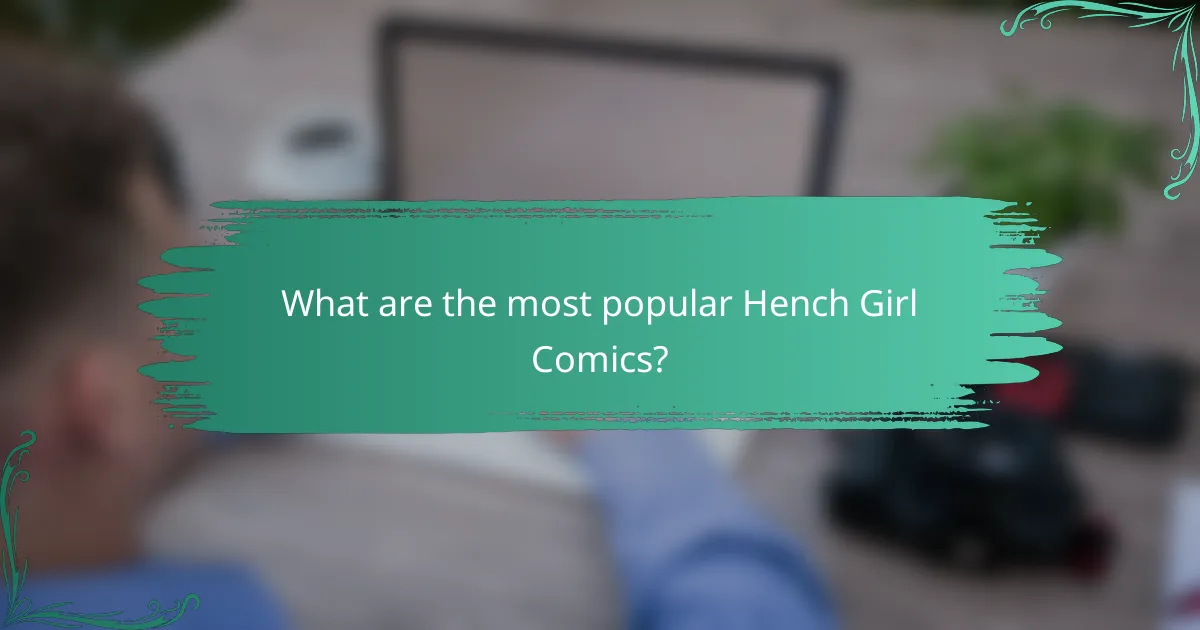
What are the most popular Hench Girl Comics?
The most popular Hench Girl comics feature strong female characters who often navigate the complexities of villainy and heroism. These narratives explore themes of empowerment, identity, and the challenges faced by women in traditionally male-dominated genres.
“Henchgirl” by Kristen Gudsnuk
“Henchgirl” follows the story of a young woman named Mary who works as a henchwoman for a supervillain. The comic blends humor with relatable themes of self-discovery and the struggle for independence. Readers appreciate its unique take on the superhero genre, showcasing the life of someone often overlooked in traditional narratives.
The art style is vibrant and engaging, which complements the witty dialogue. Gudsnuk’s storytelling emphasizes the importance of friendship and personal growth, making it a standout in the Hench Girl category.
“The Unbeatable Squirrel Girl” by Ryan North
This comic features Doreen Green, a college student with the powers of a squirrel and the ability to communicate with them. “The Unbeatable Squirrel Girl” is celebrated for its humor, clever writing, and positive representation of female empowerment. Doreen’s character embodies resilience and intelligence, often outsmarting her foes rather than relying solely on brute strength.
The series tackles various issues, including mental health and social acceptance, while maintaining a light-hearted tone. Its success has led to a dedicated fanbase and critical acclaim, making it a must-read for those interested in Hench Girl narratives.
“Ms. Marvel” by G. Willow Wilson
“Ms. Marvel” introduces Kamala Khan, a Pakistani-American teenager who gains superpowers and takes on the mantle of Ms. Marvel. This comic is significant for its representation of diverse cultures and the challenges faced by young women today. Kamala’s journey of self-acceptance and her struggle to balance her heritage with her superhero identity resonate with many readers.
The narrative addresses themes of feminism and empowerment, showcasing Kamala as a role model for young girls. The combination of relatable storytelling and cultural depth makes “Ms. Marvel” a pivotal work in the Hench Girl comic genre.
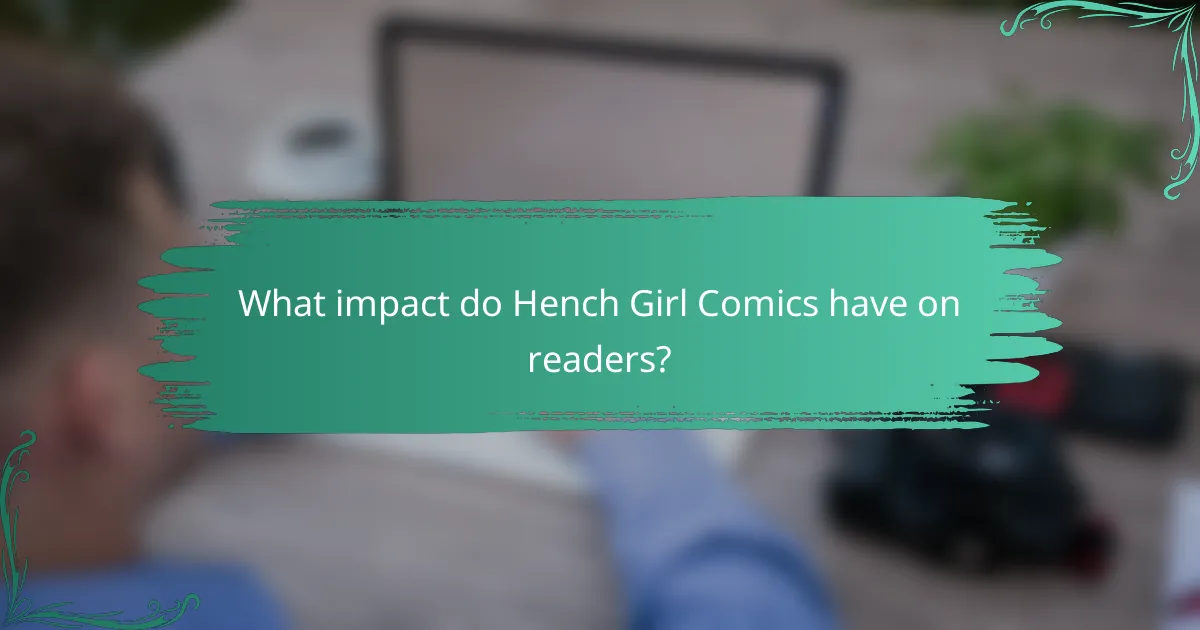
What impact do Hench Girl Comics have on readers?
Hench Girl Comics significantly influence readers by promoting themes of feminism and empowerment, while also providing rich narratives. These comics challenge traditional gender roles and encourage readers to engage with complex characters and storylines.
Inspiring young female readers
Hench Girl Comics serve as a source of inspiration for young female readers by showcasing strong, multifaceted female characters. These protagonists often defy stereotypes, demonstrating that women can be both powerful and relatable. This representation helps girls envision themselves in roles that are typically dominated by male characters.
For instance, characters who navigate their own journeys of self-discovery while facing societal expectations resonate with young audiences. Such narratives empower girls to embrace their individuality and pursue their ambitions without fear of judgment.
Encouraging critical thinking about gender
These comics prompt readers to think critically about gender norms and societal expectations. By presenting scenarios where traditional roles are subverted, Hench Girl Comics invite discussions about equality and representation. Readers are encouraged to question why certain traits are associated with masculinity or femininity.
For example, a storyline featuring a female villain who challenges the hero’s assumptions can lead to conversations about the complexities of morality and power dynamics. This critical engagement fosters a deeper understanding of gender issues among readers.
Fostering community among fans
Hench Girl Comics create a sense of community among fans who share similar values regarding empowerment and feminism. Online forums and social media platforms often host discussions where readers can connect over their favorite characters and story arcs. This interaction strengthens bonds and encourages diverse perspectives within the fanbase.
Events such as comic conventions and book signings further enhance this sense of community, allowing fans to meet creators and each other. These gatherings often feature panels that discuss the impact of gender representation in comics, providing a space for dialogue and collaboration among like-minded individuals.

What criteria should be considered when selecting Hench Girl Comics?
When selecting Hench Girl Comics, consider the art style, narrative depth, and the author’s background. These elements significantly influence the overall experience and message conveyed through the comics.
Art style and visual storytelling
The art style in Hench Girl Comics plays a crucial role in visual storytelling. Look for unique illustrations that complement the themes of empowerment and feminism, as they can enhance the reader’s connection to the characters. Bold colors and dynamic layouts often reflect the energy of the narrative.
Consider how the visual elements convey emotions and actions. For instance, exaggerated expressions or action sequences can effectively illustrate a character’s journey and struggles. A cohesive art style that aligns with the story’s tone can significantly enhance the reader’s engagement.
Narrative depth and character arcs
Narrative depth is essential in Hench Girl Comics, as it provides a richer understanding of the characters and their motivations. Look for stories that feature well-developed character arcs, showcasing growth, challenges, and personal empowerment. This depth often resonates more with readers and fosters a stronger connection to the narrative.
Evaluate how the plot addresses themes of feminism and empowerment. Comics that incorporate social issues or personal dilemmas can create a more impactful experience. A strong narrative often includes twists and turns that keep readers invested in the characters’ journeys.
Author’s background and perspective
The author’s background can greatly influence the themes and perspectives presented in Hench Girl Comics. Consider the author’s experiences and how they shape the narrative. Authors with diverse backgrounds may offer unique insights into the characters’ struggles and triumphs, enriching the storytelling.
Researching the author’s previous works can provide context on their style and thematic focus. Understanding their perspective can help readers appreciate the nuances in the comic’s narrative and art. Look for interviews or articles that discuss the author’s intentions and influences to gain a deeper understanding of the comic’s message.
